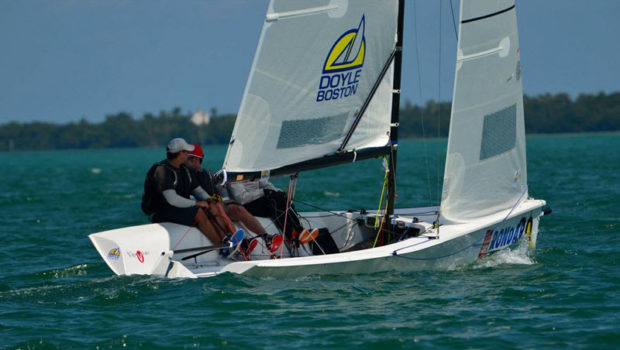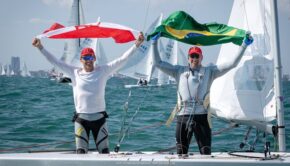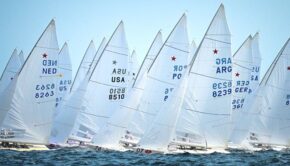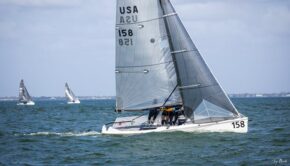The “Pros” of the Pros in Viper 640 Class
Published on June 19th, 2016
The Sailor Classification Code exists as a service to provide Events and Classes with an international system of classification for sailors. The Code seeks to sort people into two groups: Group 1 (amateur) and Group 3 (professional).
Ed “Buttons” Padin, Viper 640 Class Administrator, explains how the Viper 640 Class Rules address the issue and impact of professional sailors:
The Viper 640 Class fully embraces the notion of Group 3 sailors participating in its regattas…with only one catch. The Viper Class Rules’ Prohibitions, Restrictions, and Exemptions section starts out stating that “The Viper Class Association promotes racing between Corinthian teams.” It continues in paragraph 10.2 to state, “No helmsperson or crew member may be “paid” to sail in any race aboard a Viper.”
This was instituted largely for two reasons: to control the costs of racing a Viper (avoiding spending battles on crew, sails, etc.) and, as importantly, to maintain the personality of the Viper Class where the camaraderie of being part of the Class can be equally as important as your position on the results.
Hummm, they are “promoting” Corinthian sailing yet allow professionals as long as they aren’t being paid. As they say, “How’s that working for you?”
Actually, quite well. Those that consider themselves part of the Viper 640 community are competitive sailors, yet there is a unique camaraderie and fellowship amongst the group that balances the amateurs and the pros. Now, by far the majority of sailors racing Vipers qualify as Group 1; but there are more than a handful, mostly sailmakers, who are Group 3s.
Some of the pros within the Viper Class either own or charter boats while others crew. In no case, however, may anyone be paid to sail in a sanctioned Viper regatta. In fact, paragraph 10.2 goes on to say that a signed declaration of compliance with this Rule 10.2 by all participants on Viper 640s at a Sanctioned regatta may be required at the discretion of the Executive Committee and in a form it specifies.
At the past two Viper North American Championships, every skipper/owner signed the declaration that they were not paying their crew, and every crew had to sign a declaration saying they were not being paid. And, while there were over a dozen Group 3s participating, there was no pushback…and, with a personal knowledge of the skippers sailing with pros, I have no reason to doubt their honesty.
For professional crews, knowledge that an untrue signed declaration would be Exhibit A in a Rule 69 hearing gives enough pause to make everyone realize that it is not worth risking your livelihood as a professional sailor for a single regatta. So between the spirit of the Class and the ramifications of the declaration, compliance with this Class rule seems high.
Now, as with Group 1s, that doesn’t mean that transportation, lodging, or other expenses may not have been covered…but that’s how much of Corinthian yacht racing works.
OK, so there are pros sailing…and they aren’t getting paid to race. But, wait, there’s more!
Actually, there’s a lot more. The line between Groups, per se, is blurred on the water…and definitely at the bar and in the boat park. Yes, the pros who are part of the fleet win a lot of races, but they give back to the fleet in their own ways.
The sailmakers who have been part of the class have been leading pre/post race briefings for years, regardless of whether they are competing with friends or in their own boats, and irrespective of what logo other teams have on the tacks of their sails. Doyle Boston’s Brad Boston, North One-Design’s Ched Proctor and Zeke Horowitz, Ullman Sails Keith Magnusson and David Bolyard have been a huge influence in raising the skill level of the fleet. In addition, some of the Group 3 Viper crews, like Luke Lawrence, have written articles for the Viper newsletter and website on key boat handling techniques and tips.
What this has done is help improve the skills of every Viper sailor. Over the past five years, the quality of the sailors in the bottom half of the fleet has improved exponentially due to these pros’ contributions.
So if you’re asking a Viper sailor “How’s that going for you?” with regards to pros in their Corinthian races you’re likely to hear “Pretty damn well! Thanks to those guys sharing their knowledge with me, regardless of whose sails I’m using, I’ve become a better sailor and enjoy my time on the water more… and the cost of competing has not increased.”
Guess that’s a Win/Win for the Viper 640 Class Association.








 We’ll keep your information safe.
We’ll keep your information safe.